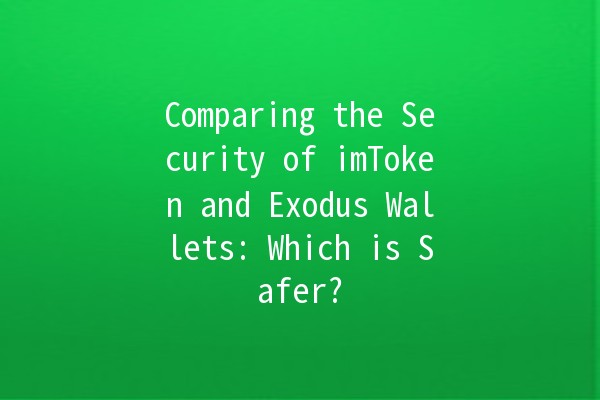With the increasing popularity of cryptocurrencies, choosing a secure wallet has become a crucial task for every crypto enthusiast. Among the many wallets available, imToken and Exodus stand out for their userfriendly interfaces and robust features. However, understanding the security aspects of these wallets is paramount for anyone serious about safeguarding their digital assets. In this article, we will explore and compare the security features of imToken and Exodus, providing practical insights for users.
Before diving into the specifics, it’s essential to understand the different types of cryptocurrency wallets. There are two primary categories:
imToken is a multicurrency wallet that focuses on simplicity and user experience. It supports a wide array of cryptocurrencies and offers features such as token exchange and decentralized app (DApp) access.

Mnemonic Seed Phrase: imToken uses a 12word mnemonic seed phrase for recovery, ensuring that only the owner can access their wallet.
Biometric Authentication: Users can enable fingerprint or facial recognition for an added layer of security when accessing the wallet.
TwoFactor Authentication (2FA): ImToken incorporates 2FA to provide additional protection during critical transactions.
Exodus is another popular multicurrency wallet known for its beautiful interface and ease of use. It's unique in that it's a desktop wallet that also offers mobile access, making it versatile for users.
Backup Code: Exodus secures user wallets with a backup code that can be generated during initial setup. This code is essential for restoring access.
No Personal Information Required: Exodus does not require any personal information to create an account, enhancing user anonymity and privacy.
Integrated Exchange: Exodus has a builtin exchange feature that allows users to swap coins without leaving the app, which keeps transactions easy and minimizes exposure to multiple platforms.
imToken: Offers biometric authentication and utilizes mnemonic seed phrases for security.
Exodus: Focuses on user privacy by not requiring personal information; however, it lacks biometric authentication.
Both wallets implement a mnemonic seed phrase which is crucial for recovering lost funds. Users must securely store this phrase offline and never share it.
Regular updates are vital for security. Both imToken and Exodus release updates to patch vulnerabilities, but it is crucial that users keep their applications uptodate.
imToken: Permits users to manage and control their private keys.
Exodus: Offers privacy due to no personal information being required, but it relies on its security measures to protect user assets.
imToken: Provides access to decentralized exchanges (DEX), which can increase the risk of interacting with unverified contracts.
Exodus: Mainly operates through its builtin exchange, reducing external exposure.
Example: Make it a habit to check for updates weekly on both imToken and Exodus.
Example: Instead of using "password123", opt for something like "C0mplex!P@ssw0rd".
Example: Use apps like Google Authenticator or Authy to secure your accounts.
Example: Use a fireproof safe or a secure deposit box for storing your seed phrase.
Example: Before logging in to your wallet, ensure you are on the official website and not a phishing site.
Both wallets are excellent choices, depending on personal preference. imToken is ideal for users interested in DApps and token exchange, while Exodus is better for those seeking an easytouse interface with integrated features.
If you lose your phone with imToken or Exodus, you can recover your wallet using the mnemonic seed phrase. Simply download the wallet app on a new device and enter your seed phrase to regain access.
Without the mnemonic seed phrase, accessing your funds is impossible. It's crucial to write down the seed phrase somewhere safe immediately after creating your wallet.
Using public WiFi can pose security risks, including maninthemiddle attacks where hackers intercept your data. Avoid accessing your wallet on public networks, and consider using a VPN for additional security.
While exchanges provide convenience, they also come with inherent risks. It’s safer to keep most of your cryptocurrency in a secure wallet (like imToken or Exodus) and only transfer what you need for trading.
Yes, many users store their cryptocurrencies across multiple wallets for diversification and enhanced security. This practice allows you to leverage the unique features of each wallet.
Security practices are crucial for all cryptocurrency users. Both imToken and Exodus offer robust features, but your diligence is what ultimately protects your assets. The strategies outlined above, along with a thorough understanding of both wallets’ unique capabilities, will empower you to make informed decisions.
Use these insights to navigate the growing digital landscape while prioritizing your financial security. Make each transaction with confidence, knowing that you have taken the necessary steps to safeguard your investments in the cryptocurrency world.